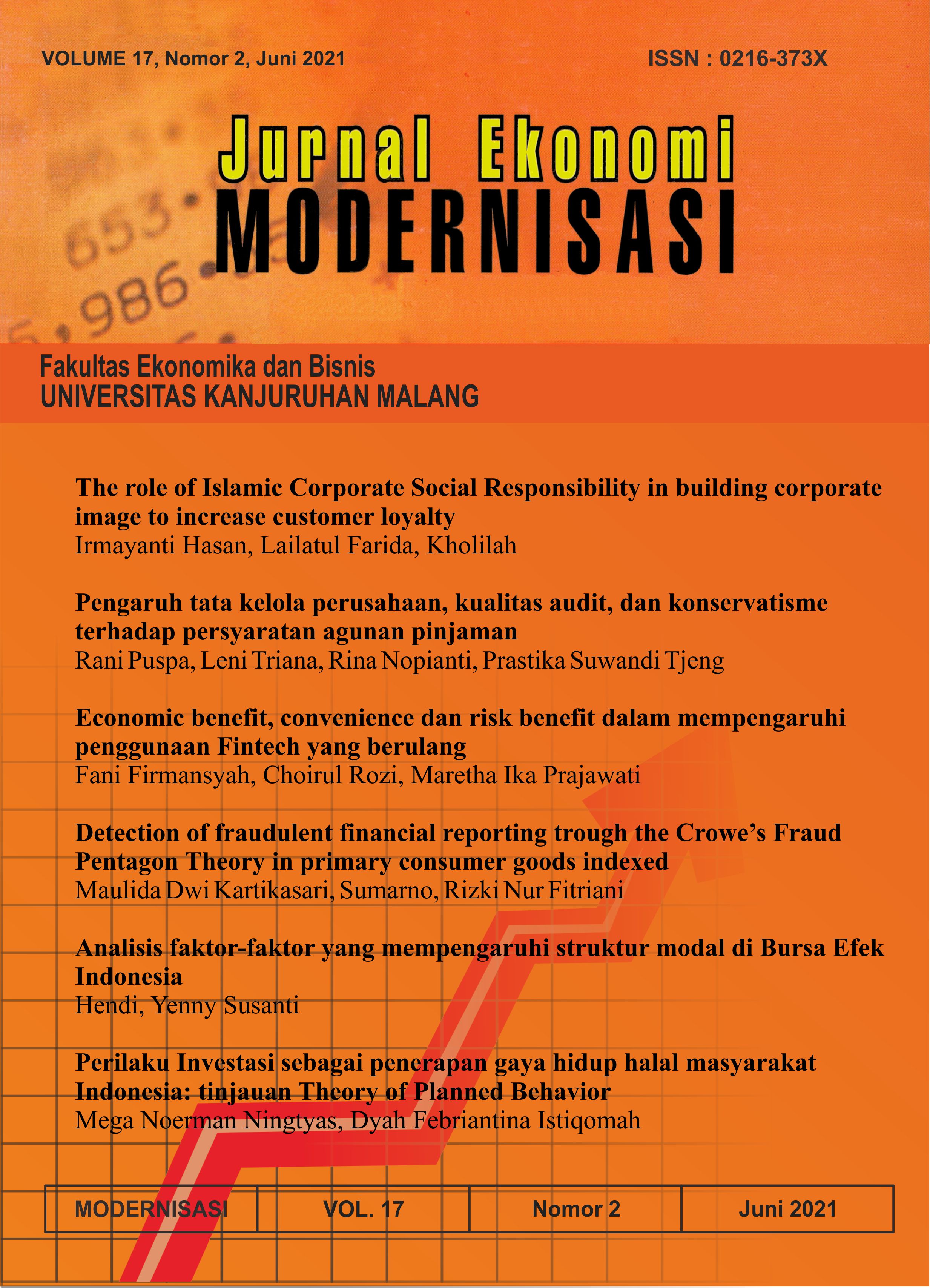Perilaku Investasi sebagai penerapan gaya hidup halal masyarakat Indonesia: tinjauan Theory of Planned Behavior
Main Article Content
Abstract
The survey shows that the community's ability to utilize Islamic financial products is still low. This fact contradicts the potential development of a halal lifestyle and the increasing number of middle-class Muslims, and the fact that 87.2% of Indonesians are Muslim. It turns out that not many people know and take advantage of Islamic financial products, including Islamic investment. The purpose of the study was to determine the factors behind investment behaviour in sharia instruments as a form of implementing the halal lifestyle of people in Indonesia. The research subjects are Muslims who have or are currently investing in sharia securities, with 100 respondents. Data were collected by distributing online questionnaires. The data analysis technique uses Partial Least Square. The results show that attitudes and perceived behavioural control affect intention in investing in sharia securities, while subjective norms do not affect. Investment intention in sharia securities affects investment decisions. This study proves that investors' assessments and perceptions of factors that can support their investment activities, such as knowledge and skills, can influence their interest in investing in the Islamic capital market. Thus, it is essential to conduct training for novice investors to provide exposure to the Islamic capital market.
Downloads
Article Details
Authors who submit a manuscript understand that if the manuscript is accepted for publication, the copyright of the article shall be assigned to Jurnal Ekonomi Modernisasi (JEM).
References
Addury, M. M., Nugroho, A. P., & Khalid, S. (2020). The Intention of Investing Sharia Stocks on Millennials: The Role of Sharia Financial Literacy. Ihtifaz: Journal of Islamic Economics, Finance, and Banking, 3(2), 89. https://doi.org/10.12928/ijiefb.v3i2.3170
Ajzen, I. (1991). The theory of planned behavior. Organizational Behavior and Human Decision Processes, 50(2), 179–211.
Akhtar, F., & Das, N. (2019). Predictors of investment intention in Indian stock markets: Extending the theory of planned behaviour. International Journal of Bank Marketing, 37(1), 97–119. https://doi.org/10.1108/IJBM-08-2017-0167
Alleyne, P., & Broome, T. (2011). Using the Theory of Planned Behaviour and Risk Propensity to Measure ... Journal of Eastern Caribbean Studies, 36(1), 1–20.
Balushi, Y. Al, Locke, S., & Boulanouar, Z. (2018). Islamic financial decision-making among SMEs in the Sultanate of Oman: An adaption of the theory of planned behaviour. Journal of Behavioral and Experimental Finance, 20, 30–38. https://doi.org/10.1016/j.jbef.2018.06.001
Borzooei, M., & Asgari, M. (2013). The Halal Brand Personality and its Effect on Purchase Intention. Interdisciplinary Journal of Contemporary Research in Business, 5(3), 481.
Chan, K. H., Ng, T. H., & Fadi, A. (2018). What Do Undergraduates Think About Green Investment? Empirical Evidence from a Developing Nation. Indian Journal of Public Health Research & Development, 9(11).
East, R. (1993). Investment decisions and the theory of planned behaviour. Journal of Economic Psychology, 14(2), 337–375. https://doi.org/10.1016/0167-4870(93)90006-7
Hair, J. F., Ringle, C. M., & Sarstedt, M. (2011). PLS-SEM: Indeed a silver bullet. Journal of Marketing Theory and Practice, 19(2), 139–152. https://doi.org/10.2753/MTP1069-6679190202
Kijkasiwat, P. (2021). The influence of behavioral factors on SMES’ owners intention to adopt private finance. Journal of Behavioral and Experimental Finance, 30, 100476. https://doi.org/10.1016/j.jbef.2021.100476
Koropp, C., Kellermanns, F. W., Grichnik, D., & Stanley, L. (2014). Financial Decision Making in Family Firms: An Adaptation of the Theory of Planned Behavior. Family Business Review, 27(4), 307–327. https://doi.org/10.1177/0894486514522483
Mahardhika, A. S., & Zakiyah, T. (2020). Millennials’ Intention in Stock Investment: Extended Theory of Planned Behavior. Riset Akuntansi Dan Keuangan Indonesia, 5(1), 83–91. https://doi.org/10.23917/reaksi.v5i1.10268
Nugraha, B. A., & Rahadi, R. A. (2021). Analysis of Young Generations toward Stock Investment Intention: A Preliminary Study in an Emerging Market. Journal of Accounting and Investment, 22(1), 80–103. https://doi.org/10.18196/jai.v22i1.9606
Octarina, E., Hartoyo, H., & Beik, I. S. (2019). Customer Purchase Intention on Sharia Mutual Fund Products: a Tpb Approach. Journal of Consumer Sciences, 4(1), 37. https://doi.org/10.29244/jcs.4.1.37-47
Palamida, E., Papagiannidis, S., & Xanthopoulou, D. (2018). Linking young individuals’ capital to investment intentions: Comparing two cultural backgrounds. European Management Journal, 36(3), 392–407. https://doi.org/10.1016/j.emj.2017.06.004
Raut, R. K. (2020). Past behaviour, financial literacy and investment decision-making process of individual investors. International Journal of Emerging Markets, 15(6), 1243–1263. https://doi.org/10.1108/IJOEM-07-2018-0379
Salisa, N. R. (2021). Faktor yang Mempengaruhi Minat Investasi di Pasar Modal: Pendekatan Theory of Planned Behaviour (TPB). Jurnal Akuntansi Indonesia, 9(2), 182. https://doi.org/10.30659/jai.9.2.182-194
Sondari, M. C., Rufaidah, P., & Djatnika, S. (2015). Using Theory of Planned Behavior in Predicting Entrepreneurial Career Intention. International Academic Research Journal of Business and Technology, 1(2), 137–141.
Sugiyono. (2019). Metode Penelitian Kuantitatif, Kualitatif, dan R&D (Cetakan Ke). Alfabeta.
Sukardani, P. S., Setianingrum, V. M., & Wibisono, A. B. (2020). Halal Lifestyle: Current Trends In Indonesian Market. 226(Icss), 334–339. https://doi.org/10.2991/icss-18.2018.68
Syarfi, S., & Asandimitra, N. (2020). Implementasi Theory of Planned Behavior dan Risk Tolerance Terhadap Intensi Investasi Peer to Peer Lending. Jurnal Ilmu Manajemen, 8(3), 864–877.
Warsame, M. H., & Ireri, E. M. (2016). Does the theory of planned behaviour (TPB) matter in Sukuk investment decisions? Journal of Behavioral and Experimental Finance, 12, 93–100. https://doi.org/10.1016/j.jbef.2016.10.002
Xiao. (2008). Applying Behavior Theories to Financial Behavior Applying Behavior Theories to Financial. Handbook of Consumer Finance Research, Chapter 5, 69–81.
Zinser, B. A. (2019). Retail Islamic banking and financial services: Determinants of use by Muslims in the USA. Journal of Islamic Marketing, 10(1), 168–190. https://doi.org/10.1108/JIMA-07-2017-0074
